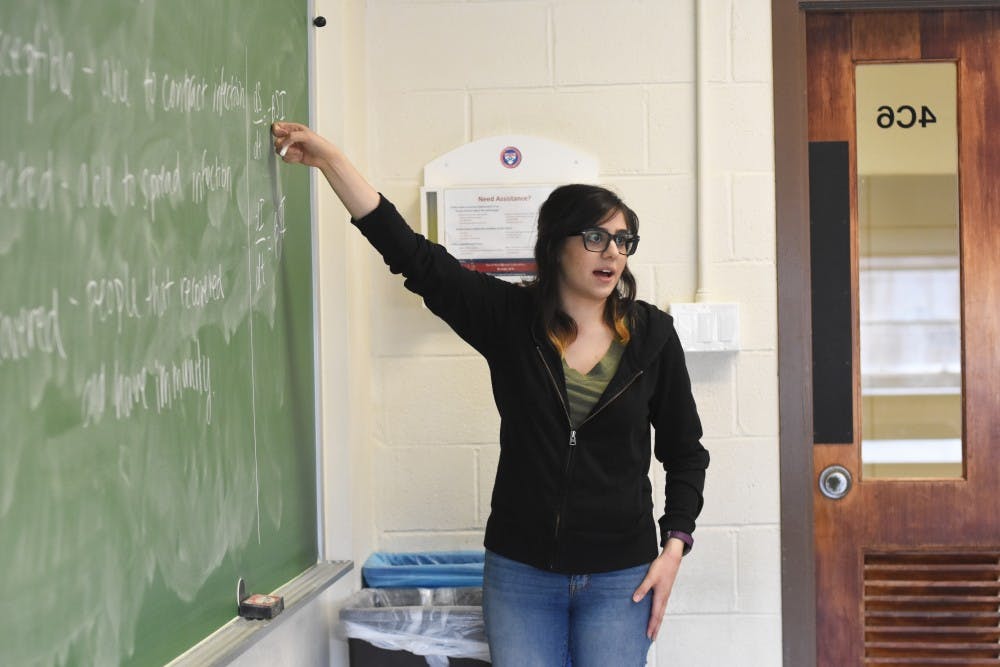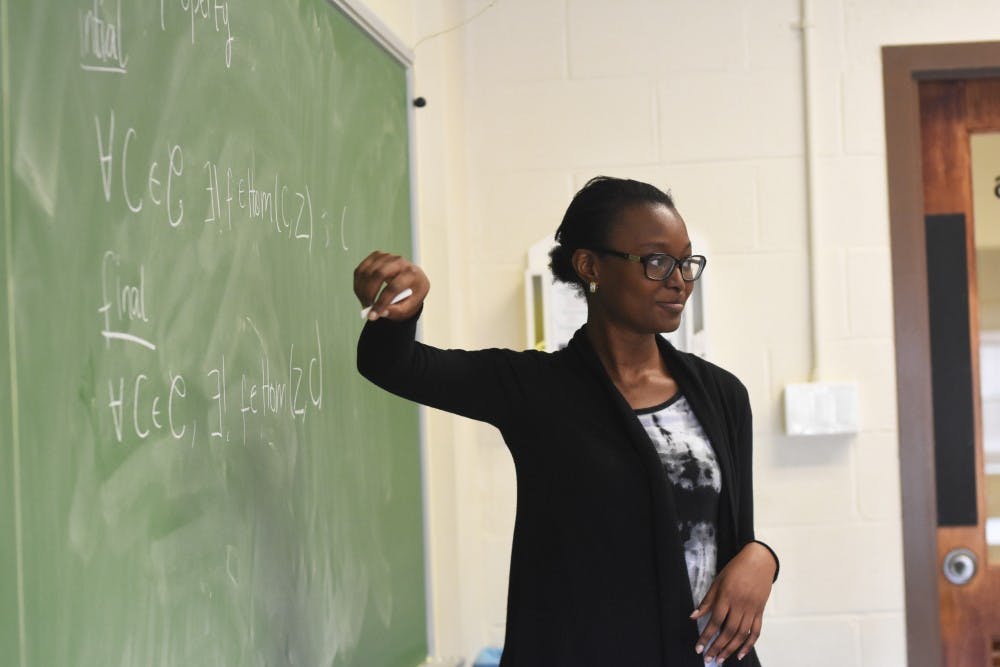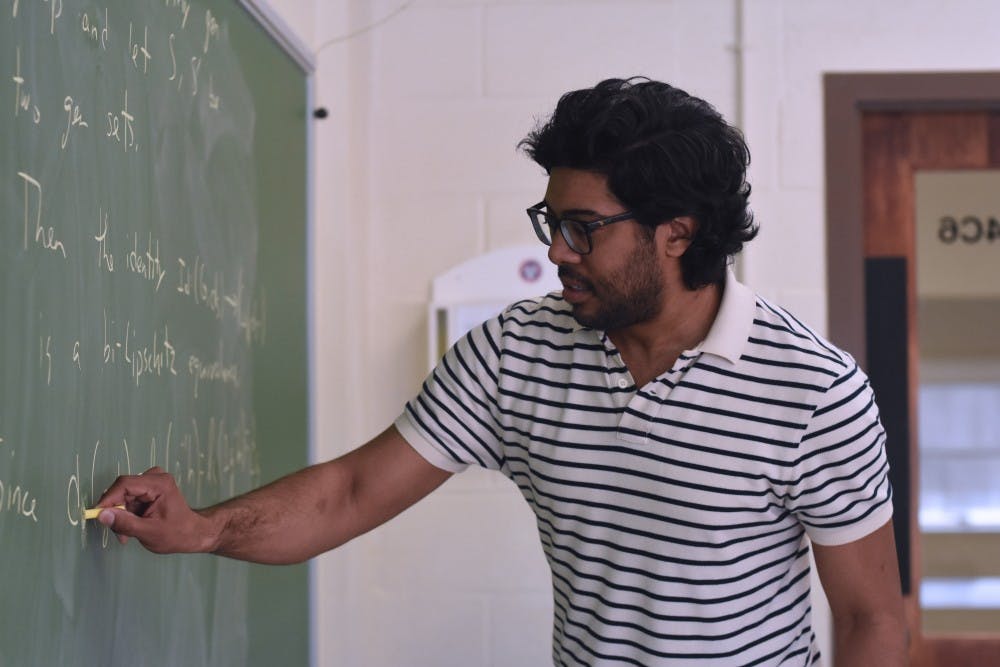
Second-year Bridge to Ph.D. student Neda Saleem.
Credit: Ari StonbergMathematics has traditionally faced issues of inclusivity — according to a recent New York Times report, there are only “perhaps a dozen black mathematicians among nearly 2,000 tenured faculty members in the nation’s top 50 math departments.” Now, a Penn program aims to change this statistic.
Penn's Bridge to Ph.D. initiative, now in its second year, allows students from underrepresented backgrounds to earn a master's degree and prepare for fast-track admission to Penn’s doctoral program in mathematics. The program offers full coverage of tuition and fees, a $25,000 annual stipend, and personal mentorship to prepare students for graduate school exams and job placement.
There are currently five students in Penn's Bridge to Ph.D. program. Three students are in the second year of their master's degrees, while two students started the program this year.
Second-year Bridge to Ph.D. student Neda Saleem said she applied to the program after realizing midway through her undergraduate studies at California State University, Northridge that she wanted to study mathematics.
"I didn’t start as a math major, so I didn’t feel prepared enough to enter straight into a Ph.D. program upon graduation," Saleem said. "I applied to the Bridge program so that I could get a stronger foundation."

First year Bridge to Ph.D. student Abiola Oyebo.
The Bridge to Ph.D. program was started in 2017 by Mathematics professors Ryan Hynd and Philip Gressman, as well as former Physics professor Larry Gladney and School of Arts and Sciences Associate Dean for Graduate Studies Eve Troutt Powell.
"In general, there are many good women and minority Ph.D. students, and there’s a lot of competition for those students among all the great universities in the country," Hynd said. "And so we thought in addition to trying to attract those students, what’s a way that we can strengthen the pipeline to our program?"
The program is tailored for students who may not have obtained the most rigorous mathematics background as high school students or undergraduates. To this end, Hynd said he and Gressman select students through two rounds of interviews rather than relying solely on GRE scores, looking for students they believe have the potential to complete Ph.D. degrees.
"They may have the aptitude, they just may not have the experience," he said.
Gressman said relative to other disciplines, math tends to be more cumulative, so gaps in education lead to far-reaching consequences in the future.
“It’s really hard to come in and do well in calculus if you didn’t have adequate preparation in algebra,” Gressman said. “And it just multiplies as you go further and further along."
Second-year Bridge to Ph.D. student Juan Lanfranco agreed that educational gaps make it difficult for underrepresented students to pursue graduate study in mathematics.

Second-year Bridge to Ph.D. student Juan Lanfranco.
“A big issue is getting to the starting line," Lanfranco said. “I didn’t go to a good high school. I didn’t go to a good junior high school. There’s a lot of factors."
The Bridge to Ph.D. program helps alleviate some of these barriers by providing full tuition coverage and a stipend, Gressman said.
"While they’re here for these two years they can focus on their studies," Gressman said. "They don't have to have jobs, they don’t have to pay tuition. I think that’s a huge thing.”
Students and faculty agreed that beyond financial support, individual mentorship is a key component of the Bridge to Ph.D. program.
"[Hynd] knows that I’m learning, and that’s also really helpful because sometimes in math, you get this feeling that you should know everything all the time," Saleem said of her mentor. "He makes me feel like it's okay if I ask questions about things, if I don’t know it right away."
Saleem added that she has learned a lot from the program, as it helped fill in gaps from her undergraduate education and figure out which areas of mathematics she is interested in studying.
"I definitely learned a lot," Lanfranco said. "The course load is pretty heavy, but it really pushes you. When you come in, you have to hit the ground running."
Professors and students also said increasing diversity in mathematics is crucial for the academic field.
"Any time you have people out there who have the interest and the ability to participate in that project, but they are being held back for other reasons — being held back for economic access, because of access to the proper education — society as a whole is losing out," Gressman said.
The Daily Pennsylvanian is an independent, student-run newspaper. Please consider making a donation to support the coverage that shapes the University. Your generosity ensures a future of strong journalism at Penn.
Donate







